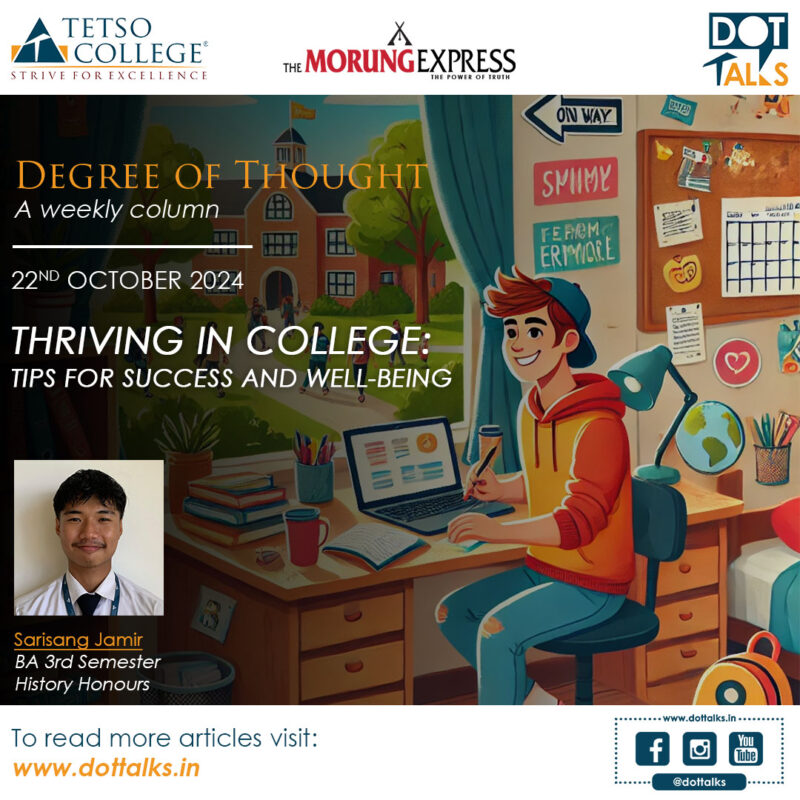
Thriving in College: Tips for Success and Well-Being
College is an exciting and transformative time in your life, filled with new experiences, challenges, and opportunities. To make the most of this journey, it’s important to balance academic responsibilities with personal well-being. While focusing on your studies is crucial, taking time to explore your interests outside the classroom can be equally rewarding. Engage in extracurricular activities, join clubs, and pursue hobbies that ignite your passion and allow you to meet new people.
Remember that challenges are part of the growth process. Seek support when needed, whether it’s through academic advising, counseling services, or talking to peers and professors. Prioritize self-care by maintaining a healthy lifestyle, managing stress, and taking breaks when necessary.
Developing time-management skills is key to juggling coursework and other commitments. Building a strong support network of friends, mentors, and study groups can help you navigate both academic and personal challenges. Take advantage of opportunities for internships, study abroad programs, or campus leadership roles to broaden your horizons and gain real-world experience.
Ultimately, college is about discovering who you are, developing resilience, and preparing for your future. Embrace the journey with an open mind and a proactive approach to both your academic and personal growth.
Here are some tips to help you thrive during your years in college:
- Stay Organized Keeping track of assignments, exams, and extracurricular activities can be overwhelming. Use tools like planners, calendars, or apps to manage your schedule. Break down tasks into smaller steps and set realistic deadlines to avoid last-minute stress.
- Develop Effective Study Habits Find a study method that works for you, whether it’s flashcards, summarizing notes, or group study sessions. Dedicate specific times for studying and stick to them. Consistent, focused study sessions are more effective than cramming the night before an exam.
- Take Care of Your Health Your physical and mental health are crucial for academic success. Make time for regular exercise, eat nutritious meals, and ensure you get enough sleep. Don’t hesitate to seek support from campus health services if you’re feeling overwhelmed or stressed.
- Get Involved on Campus Joining clubs, organizations, or sports teams can enrich your college experience. It’s a great way to meet new people, develop new skills, and take a break from academics. Engaging in campus activities can also boost your resume and provide networking opportunities.
- Managing Your Finances College can be expensive, so it’s important to manage your finances wisely. Create a budget to track your spending and avoid unnecessary expenses. Look for part-time jobs, internships, or scholarships to help with costs. Understanding your financial situation can reduce stress and help you focus on your studies.
- Build Relationships with Professors Don’t hesitate to reach out to your professors during office hours or via email. Building a rapport with them can enhance your learning experience, provide valuable mentorship, and open up opportunities for research or recommendations in the future.
- Stay Open to New Experiences College is a time to explore and discover new interests. Take courses outside your major, attend workshops, or participate in study abroad programs. These experiences can broaden your perspective and help you discover new passions and career paths.
- Practice Self-Care Balancing academic pressures with personal well-being is essential. Make time for activities that relax and rejuvenate you, whether it’s reading, hiking, or meditating. Practicing self-care can improve your overall happiness and productivity.
- Seek Support When Needed Don’t be afraid to ask for help if you’re struggling academically or personally. Most colleges offer resources like tutoring centers, counseling services, and academic advisors. Utilizing these resources can provide the support you need to succeed.
- Stay Positive and Persistent College can be challenging, but maintaining a positive attitude and staying persistent is key. Learn from setbacks, celebrate your achievements, and keep pushing towards your goals.
Remember, it’s a journey, and every step, whether forward or backward, is part of your growth. Thriving in college involves a balance of hard work, self-care, and embracing new experiences. By staying organized, managing your time effectively, and taking care of your health, you can make the most of your college years and set the foundation for a successful future.
Don’t be afraid to step out of your comfort zone—whether that means trying new classes, meeting people from different backgrounds, or tackling challenges head-on. Mistakes and setbacks are normal; they are opportunities for learning and self-improvement. Stay open to feedback, and use it as a tool to refine your skills and approach.
Remember to celebrate small victories along the way. Acknowledging your progress can motivate you to keep moving forward. Seek out mentorship and build connections with peers, faculty, and professionals in your field—these relationships can provide guidance and open doors for future opportunities.
Lastly, cultivate a mindset of lifelong learning. College is not just about acquiring knowledge for a degree but also about developing critical thinking, adaptability, and problem-solving skills that will serve you well beyond graduation. By approaching your college experience with enthusiasm and a growth mindset, you’ll be well-equipped to thrive both academically and personally.
Degree of Thought is a weekly community column initiated by Tetso College in partnership with The Morung Express. Degree of Thought will delve into the social, cultural, political and educational issues around us. The views expressed here do not reflect the opinion of the institution. Tetso College is a NAAC Accredited UGC recognised Commerce and Arts College. The editorial team includes Chubamenla, Asst. Professor, Dept. of English and Rinsit Sareo, Asst. Manager, IT, Media & Communications.
For feedback or comments please email: dot@tetsocollege.org

